Greening Foreign & Security Policy
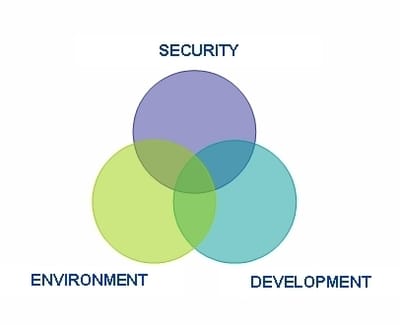
Working especially with Members of the European Parliament, the aim is to promote the forging and implementation of an integrated strategy for environment, sustainable development and security - or the better inclusion of environmental security aspects in the EU Common Foreign and Security Policy, European Security Strategy and European Sustainable Development Strategy.
Key issues being addressed include:
- Mainstreaming Environmental Factors into EU Foreign Policy
- Mainstreaming of Conflict Prevention into EU Development Cooperation
- Civilian-Military Cooperation
- EU-US Cooperation
- Energy Security and Climate Security
- Relation to Other External Policies
Which of the individual sectoral policies (agricultural and rural development; health policy; energy policy and technology transfer; trade liberalisation etc.) are most likely to be decisive in combating poverty and reducing insecurity and instability in the world’s most vulnerable developing countries?
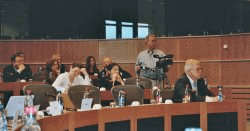 The programme was launched at the Symposium on Sustainable Development and Security at the European Parliament on 31 May 2006. The aim of the symposium was to raise political issues with interested Members of the European Parliament related to improving the integration of environmental and development concerns, notably Climate Change, into the EU's existing Common Foreign and Security Policy (CFSP) and the European Security Strategy.
The programme was launched at the Symposium on Sustainable Development and Security at the European Parliament on 31 May 2006. The aim of the symposium was to raise political issues with interested Members of the European Parliament related to improving the integration of environmental and development concerns, notably Climate Change, into the EU's existing Common Foreign and Security Policy (CFSP) and the European Security Strategy.Working Groups on Greening European Foreign and Security Policy
Four working groups were set up to review current policies and best practices and seek to identify gaps in European and international policy and action with respect to four stages in the conflict cycle:
Group A: Predicting Instability - Monitoring, risk assessments and early warning in vulnerable areas and measures to avoid conflict.
Group B: Preventing Conflict - Policy instruments and measures for areas of escalating tensions and for conflict prevention (military and non-military).
Group C: Building Peace - Crisis management and resolution in the event of conflict (military and non-military).
Group D: Recovery and Transition - Post conflict restoration, reconstruction and structural adaptation.
The working groups should produce policy recommendations taking into account the relationships between:
- Environment and Development
- Security and Development
- Environment and Security
The starting point for the groups will be to review the Report and Resolution on Environment, Security and Foreign Affairs adopted by the European Parliament on 28 January 1999 and the subsequent actions in this field by the European Commission.
Working especially with GLOBE-EU Members of the European Parliament, the groups presented their proposals for political action by the European institutions and Member States at a conference on Greening Foreign and Security Policy: The Role of Europe held in Brussels on 6-7 December 2006.
For more information about the working groups visit the GFSP blog.
 Joint Report of the GFSP Working Groups
Joint Report of the GFSP Working GroupsBrussels, 12 March 2007
It is increasingly clear that environmental change and struggles over control of natural resources can threaten global, national and human security. As a consequence, effective conflict prevention policies need to incorporate environmental and natural resource management. Key concerns include deforestation and desertification, and land and water scarcities. In addition, climate change is rapidly becoming an unambiguous reality. >> Download the Report
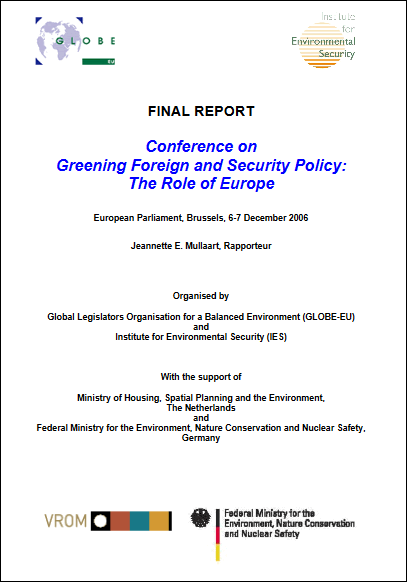 Final Report, Conference on Greening Foreign and Security Policy:The Role of Europe, Brussels, 6-7 December 2006
Final Report, Conference on Greening Foreign and Security Policy:The Role of Europe, Brussels, 6-7 December 2006With the May symposium, the inventory of policies and practices and the draft reportsof the working groups serving as a background, GLOBE-EU and IES convened theDecember conference with the main objective being to promote the better integrationof environment and sustainable development concerns and objectives into Europeanforeign and security policy and programmes.
The event was organised as a working meeting with participants and speakers (fromthe European Council, European Commission, European Parliament, EU MemberStates, NATO, OSCE, UNDP and UNEP) reviewing the draft interim reports of theworking groups and highlighting the roles played by their respective institutions withregard to the interface between environment, security and sustainable development. >> Download the Report
Background Documents
All links are to PDF files under 100KB, unless otherwise marked.
EU Policy:
- Report on the Environment, Security and Foreign Policy of the Committee on Foreign Affairs, Security and Defence Policy, European Parliament, Rapporteur: Mrs Maj Britt Theorin. 14 January 1999 (PDF 144KB)
- Resolution on the Environment, Security and Foreign Policy of the European Parliament, 28 January 1999
- A Secure Europe in a Better World: European Security Strategy, 12 December 2003
- Message from Margot Wallström, Commissioner for the Environment, to The Hague Conference on Environment, Security and Sustainable Development, The Peace Palace, The Hague, 9-12 May 2004
Role of the Military:
- Book Review: The Utility of Force - The Art of War in the Modern World by General Sir Rupert Smith / Reviewed by Robert Cooper
- Impact of the Military / Conflict on the Environment: Nature in War - Biodiversity Conservation by Esther Blom, Netherlands Working Group on Ecology and Development
- The Effects of War on Biodiversity in Tropical Forests by Jeffrey A. McNeely, Chief Scientist, IUCN-The World Conservation Union (PDF 860KB)
Related Publications:
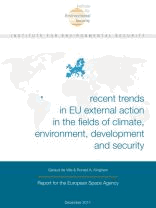 Recent Trends in EU External Action in the Fields of Climate, Environment, Development and Security: Report for the European Space Agency
Recent Trends in EU External Action in the Fields of Climate, Environment, Development and Security: Report for the European Space AgencyIES, Brussels, December 2011
This report was prepared at the request of the European Space Agency in order to provide the ESA with information on the evolution of EU external action in the fields of climate, environment, development and security. The main purpose is to advise the Agency on the latest developments in the EU external action in these policy areas. >> Download the Report
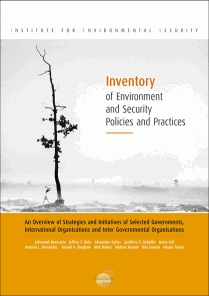 Inventory of Environment and Security Policies and Practices (IESPP): An Overview of Strategies and Initiatives of Selected Governments, International Organisations and Inter-Governmental Organisations
Inventory of Environment and Security Policies and Practices (IESPP): An Overview of Strategies and Initiatives of Selected Governments, International Organisations and Inter-Governmental OrganisationsIES, The Hague, October 2006
This report provides an easy to use comparative overview of existing governmental and inter-governmental positions and actions dealing with the relationship between environment, security and sustainable development. >> Download the Report
Related Events
SOS: Suicide or Survival – The State of the Earth – Diagnosis and Prognosis, The Hague, 18-19 April 2018
Planetary Security Conference 2016: Addressing the Risks of Climate Change, The Hague, 5-6 December 2016
Planetary Security: Peace and Cooperation in Times of Climate Change and Global Environmental Challenges, The Hague, 2-3 November 2015
Co-operation to Minimise the Risks Posed by a Changing Climate: Working together on the most important 21st century global security threat, Brussels, 23-24 September 2013
Environmental Dimensions of Security - The Next Steps of ENVSEC, Brussels, 13 November 2008
The impact of the US Elections on Transatlantic Relations, Brussels, 12 November 2008
The Perfect Storm: Trade, Finance and Climate in 2009, Brussels, 15 September 2008
Globalization and Environmental Challenges, Brussels, 14 July 2008
The Geopolitics of Climate Change, Brussels, 23 April 2008
Forces for Sustainability, The Hague, 14-15 March 2007
Greening Foreign and Security Policy: The Role of Europe, Brussels, 6-7 December 2006
Symposium on Sustainable Development and Security, Brussels, 31 May 2006
Forum on Environment, Conflict and Cooperation, The Hague, 7 March 2006
Symposia on the State of the World - 2005: Redefining Global Security, The Hague, 28 February 2005 / Brussels, 1 March 2005
The Hague Conference on Environment, Security and Sustainable Development, The Hague, 9-12 May 2004